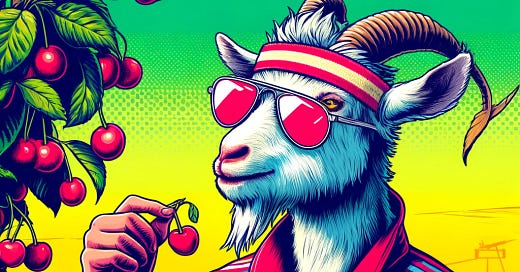Who doesn’t like cherries?
Now that they’ve been selectively cultivated for centuries, starting with ancient Greece, cherries are as easy to enjoy as they are delicious. People all over the world cherish cherries.
These little spherical fruits with stems and seeds grow on trees. All you have to do in order to enjoy them is to grasp a ripe cherry by the stem and twist it right off of the branch. Then, rinse it off and eat it. That’s it!
Oh yeah, watch out for the pit. You’re smart, though, so you already know that part.
There’s one other thing about this process that’s important, though, and it might go without saying if we didn’t point it out: you have to pick the right cherries. You can do this by giving them a little squeeze; if it gives a little and it’s that deep “cherry red” color, you have a delicious, ready-to-eat treat.
You have to pick the ones that are ready to pick. Pick can mean to select as well as to remove from a vine.
This is the origin of the term "cherry picking." The idea is that you’re selectively choosing only the best and most ripe cherries from the tree, leaving behind the ones you don’t want.
Similarly, you can cherry-pick data you want to see or share with someone else, and ignore anything that challenges your narrative. It’s a really good metaphor, and one that most people can understand immediately.
The problem with selectively presenting data is that you don’t get an accurate picture of the underlying reality, instead getting some pretend idealized version of what’s really out there.
One prominent example of cherry-picking comes from what’s today referred to as Big Tobacco. All throughout the 20th century, the tobacco industry faced growing evidence that smoking was dangerous for your health. To counter this pressure, they funded their own research.
Unsurprisingly, their studies reported that cigarettes were much safer than those fearmongering scientists were suggesting, what with their actual data and what-not.
Today, all tobacco companies face constant existential risk from regulation from lawsuits stemming from all that earlier cherry-picking. By presenting a falsely rosy picture of smoking’s risks, they tricked an awful lot of folks into thinking it was relatively risk-free, and even healthy to smoke. This killed millions.
Marketing itself is cherry-picking, at least in a way. The idea is to present the positive side of your product or service, in order to convince someone to buy it. You don’t exactly want to highlight all the risks if you’re trying to convince someone to do something, so this is a natural arena for the practice of cherry-picking.
Cherry-picking isn’t just prevalent in the world of marketing, though.
In 1998, a now-discredited researcher named Andrew Wakefield published a paper in the medical journal Lancet describing how eight of twelve children had developed autism within a month of receiving the MMR (Measles, Mumps, and Rubella) vaccine.
First of all, a study so small is kind of silly. You can’t really draw any meaningful conclusions from such a small sample, and the smaller the sample set is the more likely you are to have results that are not consistent with the wider world.
Even worse, the dozen children were far from a random sample. Wakefield selected the children for the study himself on the recommendation from lawyers who were involved in lawsuits against vaccine companies.
Let’s allow that statement to hang in the air for just a moment.
Could there be a more biased sample set? Could there be more cherry picking?
As it turns out, there could. Wakefield relied on parents remembering details, selecting the anecdotes that fit his narrative, and ignoring existing studies that found no link between the MMR vaccine and autism.
As a result of his narcissistic grandstanding, Wakefield is completely discredited today, with study after study confirming it. Having lost all academic credibility, Wakefield’s Wikipedia page even begins by describing him as a fraudster.
But the damage had already been done. Wakefield’s proclamation sparked widespread fear and misinformation about vaccines, leading to a decrease in vaccination rates and a resurgence of preventable diseases like measles.
Cherry-picking is a dangerous practice.
Whether it’s intentional or not, it can have devastating consequences, as the examples I’ve cherry-picked for you clearly show…. or do they? Is there some benefit to selective data presentation I’ve missed here—can cherry-picking be a good thing?
Let me know in the comments! Let’s talk.








I was wondering if you'd bring up Wakefield. The scary thing is how easily the lie latches on and how hard it is to dislodge. Even though his study---which arguably kicked off the anti-vax movement---has long been discredited, there's no shortage of people who now treat "Vaccines cause autism" as an axiom.
It is not directly cherry-picking (However, it is possible he was only cherry-picking those points that can be easily ridiculed, thereby sidestepping the more substantial and serious evidence presented in the Surgeon General's report). Still, someone using anecdotes to explain, especially a person who wrote a book about "How to Lie with Statistics":
Darrell Huff, author of the wildly popular (and aptly named) How to Lie with Statistics, was paid to testify before Congress in the 1950s and then again in the 1960s, with the assigned task of ridiculing any notion of a cigarette-disease link. On March 22, 1965, Huff testified at hearings on cigarette labeling and advertising, accusing the recent surgeon general’s report of myriad failures and “fallacies.” Huff peppered his attack with amusing asides and anecdotes, lampooning spurious correlations like that between the size of Dutch families and the number of storks nesting on rooftops—which proves not that storks bring babies but rather that people with large families tend to have larger houses (which therefore attract more storks).